
- •CONTENTS
- •BRITAIN IN MIDDLE AGES 13
- •ANCIENT BRITAIN
- •Had Harold waited and given his army a rest, the outcome of the battle might have been different.
- •BRITAIN IN MIDDLE AGES
- •early middle ages
- •later middle ages
- •Key words, terms and concepts
- •Anglo-Norman Britan
- •Later Middle Ages
- •Britain in Late Middle Ages
- •THE STUARTS AND THE STUGGLE OF THE PARLIAMENT AGAINST THE CROWN
- •THE 18тн CENTURY–OF WEALTH, TECHNOLOGICAL REVOLUTION AND POWER
- •Содержание

THE 18тн CENTURY–OF WEALTH, TECHNOLOGICAL REVOLUTION AND POWER
Key words, terms and concepts: A 1. War for Spanish Succession
2.The Duke of Marlborough
3.Blenheim and Gibraltar
4.The Union with Scotland (1707)
5.The Hanoverian Dynasty
6.The National Debt
7.The South Sea Bubble
8.Robert Walpole
9.Jacobite revolts–the old Pretender and the Young Pretender
10.William Pin "the Elder"
11.George III, "the Patriot King"
12.Boston Tea Party
13.The Declaration of Independence
14.Adam Smith "The Wealth of Nations"
В1. Technological Revolution
2.James Watt
3.J. Wedgwood
4.Admiral Horatio Nelson, the Battle of Trafalgar (1805)
5.The Battle of Waterloo–the Duke of Wellington
6.Robert Owen
7.Wordsworth, Coleridge, Byron, Shelly, Keats
8.Turner, Constable
The end of the 17th century and the start of the new century, were the periods of wars in Europe. Britain was involved into the Nine Years War (1688-1697) and the War for Spanish Succession (1702-1713). France had become a permanent enemy, and the grand strategy of Britain was to stop the French expansionist policies: to struggle against the French competition in trade, and also to interfere in the affairs of the Spanish Empire.
The Whigs in the British Parliament supported the interventionist foreign policy of William III of Orange and his favourite general – John Churchill who was already the Duke of Marlborough. After the death of Mary and William they were succeeded by Anne (1702-1714). Marlborough was the commander of the Army and was successfully fighting against the French attempts to place a French prince on the Spanish throne. The established Church and also gained free trade with England.
England, Scotland and Wales were united and became Great Britain.
The Tones opposed the military actions of their successful opponents, the Whigs.
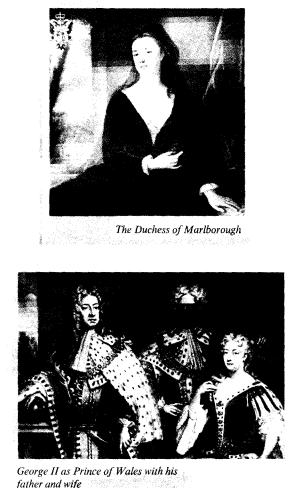
The Duchess of Marlborough, who had been very friendly and close to Queen Anne, was replaced by a lady, supporting the Tories. They came to power in 1712 and began negotiating peace with France. The Treaty of Utrecht was signed in 1713 according to which the Crowns of France and Spain were never to be united, Britain gained many advantages–new territories, such as Gibraltar, Minorca, Newfoundland and Nova Scotia, and the right to sell slaves to the Spanish colonies. Great Britain had became a great European power.
Queen Anne was the last Stuart monarch, she died in 1714; and according to the Act of Settlement, she was succeeded by Protestants of Hanoverian Dynasty. George I (1714-1727) was an elderly and unpreposessing German who could speak no English.
The consequences were that the Whigs surrounding the King were handed over many of the royal prerogatives and their leader became the Chair man of the King's Council. That was the beginning of the Cabinet system of Government in Great Britain, with a Prim Minister presiding over the Cabinet.
The Whig domination lasted for half a century. It was troubled by the Jacobite Rebellion in 1715 and by the growing National Debt. It had been create to help to pay for war, and by 1713 it had risen to £54 million.
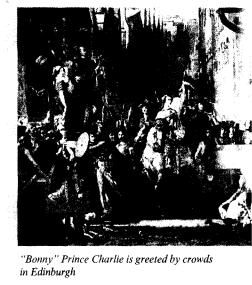
In 1717 one of the Whig ministers Robert Walpole (later known as the first Prime Minister) introduced "the sinking fund" to be used to paying off the Debt from the taxes.
The South Sea Company, founded in 1711 to trade in slaves, offered to take over a large part of the Debt which was followed by a great rise of the value of its shares. "The South sea bubble" burst up in 1720, collapsed like a pitched bubble and ruined many investors.
Robert Walpole was called to remedy the financial situation in the country. In 1721 he became the first Prime Minister and an outstanding statesman. The main objectives of his policy were peace and prosperity.
His motto was "let the sleeping dogs lie". He had been in office for twenty years and stabilized the financial situation with the help of taxes imposed on goods sold within the country.
The taxes on tea and coffee were a success, but the taxes on wine and tobacco aroused protests of his opponents and people in the country.
When George II became king (1727-1760), he continued his father's policy and relied upon R. Walpole as Prime Minister. But the opponents from the Tones were attacking Walpole, especially the young talented politician W. Pitt (the Elder), – and much against his will, the Prime Minister was forced to start a war against Spain. But he didn't direct it properly in the opinion of his Parliamentary critics, and had to resign. But he continued to have an influence on George II. Sir Robert Walpole became a very rich man, had a rich collection of paintings which was sold by his grandson to Catherine the Great of Russia.
1745 was the year of another Jacobite attempt to restore the Stuarts. James, the Old Pretender, had been recognized by the Scottish opposition as James III, toasts had been drunk "for the King beyond the sea", but James was passive and didn't undertake any steps. His son and the grandson of James II, Charles Edward or the Young Pretender, landed in Scotland together with his seven followers. They were enthusiastically greeted by the Highlanders, who revolted in support of this romantic handsome young man and called him Bonny Prince Charlie. The Jacobite rebels captured Edinburgh the capital of Scotland but failed to withstand the attacks of the regular English army, they were defeated at the Cullodon Moor and scattered. Charles Edward escaped back to France. The Highlanders were subjected to cruel punishments and repressions. The old clan system was destroyed, it was forbidden to wear a kilt or to play bagpipes. Leaders were executed, many Highland families left the country. The Highlanders were brought under the control of the central Government.
The most important opponent of Sir R. Walpole was William Pitt "the Elder", later Lord Chatham who was determined to strengthen the economic power of Britain and to defeat France in the trade competition overseas. He agreed with Daniel Defoe the author of Robinson Crusoe, who had written in 1728 "Trade is the wealth of the world, trade makes the difference between rich and poor, between one nation and another".
When Lord Chatham became the secretary of state he directed British efforts at destroying French trade and driving the French from North America; that policy culminated in the capture of Quebec, Montreal and other triumphs of the "Year of Victory" (1759). In India the British became the masters of Bengal. India became the "jewel of the Crown" of Britain's foreign possessions. In 1760 George II was succeeded by his grandson George III (1760-1820). He was the first Hanoverian to be born in Britain. He declared himself Patriot King and was determined to take a more active part in the government of the country. His Government, his Cabinet included the Tones who were described as King's Friends.
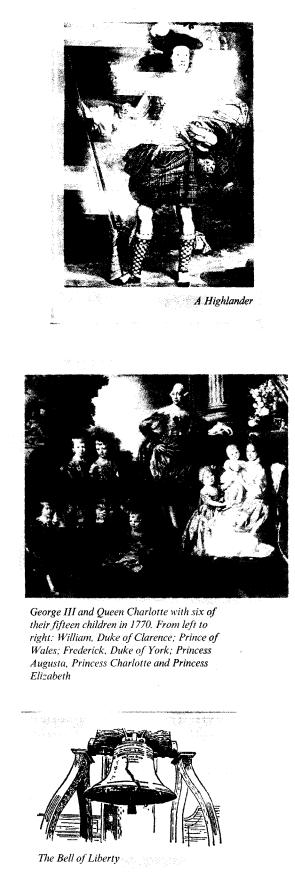
William Pitt, the Elder, had resigned as his new military plans did not find an understanding of the young King, who wanted to make peace with France (1763) and other European countries.
Meanwhile there were deteriorations in the relations with North American colonies. The colonists objected to the taxation from Westminster declaring their demands – "No taxation without representation". The King's new minister Lord North didn't stop George III from mismanaging the affairs in North American colonies.
The Boston Tea Party in 1773 was the protest against the Stamps for tea taxes, when the colonists threw the East India Company's tea into the harbour. The Parliament undertook repressions though the opposition of
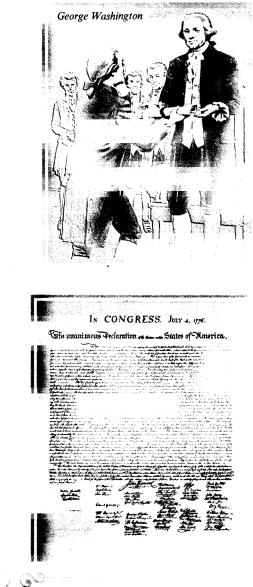
Whigs were against this disastrous policy.
There were military conflicts near Lexington and Concord near Boston. The Congress of the United Colonies at Philadelphia elected George Washington, of Virginia commander of their armed forces (1775). A year later, on the 4 of July, 1776, the Congress adopted the Declaration of Independence.
The English army was defeated in the battle of Saratoga and was forced to surrender. The war of Independence was won by the American forces supported by the French and when the Peace treaty was signed in 1782 in Paris, thirteen North American colonies transformed themselves into the United States of America with George Washington as their first President.
The defeat of Britain in North America ended the period of George III personal rule. The new Tories were his only hope, and in 1783 the King invited William Pitt, the younger, Lord Chatham's twenty-four year old son to form a Cabinet.
The reign of George III was the period of the great activity of the Literary Club, headed by the literary and linguistic dictator Dr. S. Johnson among whose members were Sir Joshua Reynolds, Goldsmith, Burke, Fox, Gainsborough, Sheridan and Adam Smith. The book by Adam Smith "The Wealth of Nations" appeared in the year of the Declaration of Independence; in it the great economist presented the first classical system of economic activities of people. James Watt in 1782 improved the steam engines and his inventions made possible the Industrial Revolution.
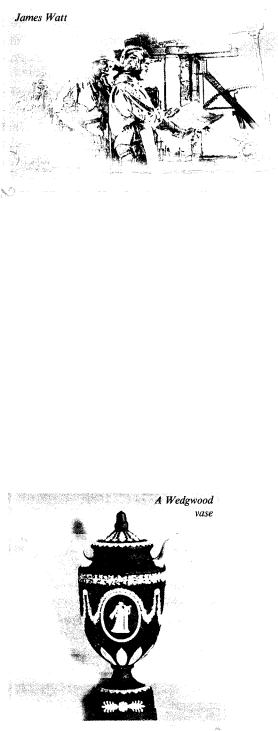
Questions:
1.What were the English gains in the War for Spanish Succession?
2.When did the United Kingdom of Great Britain appear and how?
3.Who was the first Prime Minister in Britain?
4.In what way was George III different from his father and grandfather in his attitude to the government of the country?
5.Speak of the reasons and the outcome of the War of Independence in North America.
The technological Revolution was a new breakthrough in the economic and social development of Great Britain. It was a British way of bourgeois development, in contrast to the French Revolution. Chronologically its beginning is referred to the middle of the 18th century; and the first achievements were in the production of agricultural products due to the new farming techniques.
Mechanical inventions facilitated the unprecidented growth of iron and coal production. By 1800 Britain was producing four times as much coal as it had done in 1700 and eight times as much iron. John Wilkinson was making iron bridges, an iron chapel, iron boats. James Wattmade a steam engine in 1769. In 1764 a spinning machine was invented that could do the work of several people. The machines for spinning and weaving revolutionized the cloth making industry and transformed it from a cottage industry into a factory industry which was run and controlled by factory owners. Cotton textiles played the leading part in Britain's economic expansion.
Britain was importing raw cotton from its colonies and exporting the finished cotton cloth to sell in Europe and in the colonies as well. Manchester became the centre of the cotton textile industry.
In the Midlands manufacturing of china goods was developing successfully and large quantities of bone china were exported. The most famous factory was one started by master potter Josiah Wedgwood. His high quality bone china and blue china became popular, and now Wedgwood is the trade mark of most exquisite English china. The area of this industry's location is known as "the Potteries".
The industrial revolution involved a revolution in transport. Man-made canals together with rivers linked

the main ports of England, roads were improved and a service of post coaches was started in 1784.
The end of the 18th century was the period of social disintegration – the wealth of the few was growing while the misery and poverty of the majority of people were increasing equally rapidly. Deprived of the means of production workers had lived in slums and worked long hours for very low wages in factories and mines. The country was splitting into two nations – the rich and the poor.
There were many reasons for discontent in Britain, but the Revolution in France in 1789 was first welcomed in England by liberals, but it was becoming ferocious and bloody, the British ruling classes were frightened that similar events might happen in Britain. The Book by E. Burke "Reflections on the Revolution in France" was a serious warning of the dangers of radicalism. The Government took tough measures against the working class movement and organisations that were appearing: mass meetings were forbidden, associations of workers were declared illegal.
Pitt had been Prime minister after 1784 almost all his life. But the King (George III) was an old sick man, who was not always in his right mind, so the position of the P. M. was extremely important. Pitt was determined to maintain peace, but Revolutionary France declared war in 1793. The British troops were defeated in the Netherlands and the French West India, and the situation became more dangerous when a New French general appeared on the political scene – Napoleon.
The British were rescued by their Navy. The commander of the British fleet, admiral Horatio Nelson won brilliant victories over the French navy, near the coast of Egypt, at Copenhagen and near Spain. At the Battle of Trafalgar in 1805 Nelson destroyed the French-Spanish fleet, but was killed by a sniper. He became one of Britain's greatest national heroes. His words to the English fleet before the battle of Trafalgar "England expects that every man will do his duty" are preserved in the memory of the nation as a historic example of partiotic duty in the time of danger.
The greatest general of the British army in the actions against Napoleon became the Duke of Wellington (Sir Arthur Wellesley 1769-1852).
After the disastrous invasion of Russia (1812) Napoleon was defeated by the European coalition in the Battle of Nations at Leipzig (1813), was imprisoned on the isle of Elba and escaped from it to reappear in Paris again. The last battle was fought in Belgium at a small place called Waterloo (1815). The British army led by Wellington and the Prussian army under Marchal Bluher defeated Napoleon, he had to abdicate and was sent to St. Helena in the South Atlantic and died there.
The Congress of the European Powers held at Vienna made peace and Britain emerged from the "Napoleonic Wars" a great empire: to Canada, Australia and most of India she added Cape Colony (South Africa), Ceylon and Guinea as well as a number of small provinces.
But this newly enlarged great power was suffering from internal problems: political and economic reforms had been long overdue, the years of the war had been a period of repressions, and the position of the workers and the poor had deteriorated.
The first political measure of the Government was a Corn Law prohibiting the import of cheap foreign grain. It was followed by riots and more repressions, some demonstrators were killed in the "Massacre of Peterloo" in
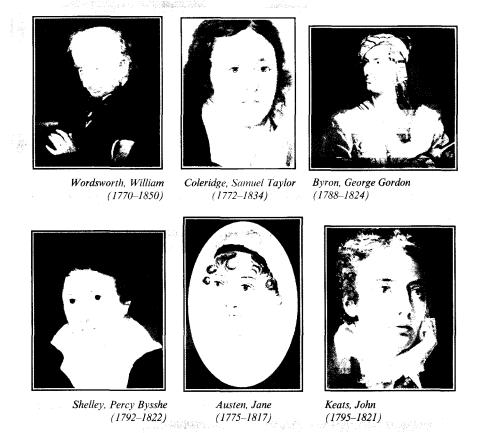
Manchester. The people had their progressive champions who criticized the established institutions and created "new settlements of the greatest happiness of the greatest number". Robert Owen, the philanthropic factory owner and a theorist of Utopian socialism, who influenced the development of the working class movements– cooperative retail societies and trade unionism was one of them.
The social and political changes in the world involved a revolution in the arts. A brilliant galaxy of writers and poets looked for inspiration to nature, to emotions and to the spirit of freedom. Lyrical Ballads of Wordsworth and Coleridge were published in 1798. The works of Byron, Shelly and Keats were romantic and emotional. Jane Austen was not carried away by the Romantic Movement and in her domestic miniatures described the adventures of young lovers in the English country houses.
Painting was equal to the achievements of poetry. Landscape painting produced two great but very different geniuses – Turner and Constable.
The old King (George III, 1760-1820), blind, insane, died in 1820 and was succeeded by little respected George IV (1820-1830) who had been Prince Regent for the last nine years of his father's life (1811-1820).
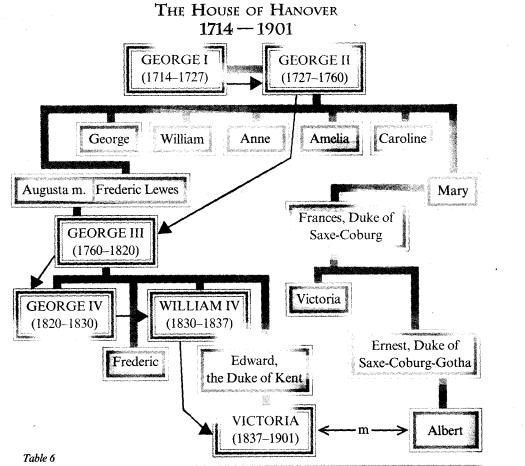
Questions:
1.In what way is it traditional to compare the French bourgeois revolution and the Technological Revolution in Britain?
2.What branches of industry were progressing immensely in the Technological revolution?
3.What social situation was developing due to the technological revolution in Britain in the middle of the 17th century?
4.What were the military developments in the Napoleonic wars against France?
5.What were the victories of the Anti-Napoleonic coalition and what military heroes glorified Great Britain?
6.What territorial advantages did Great Britain gain out of the Vienna congress?
7.What were the internal problems of Britain at that time?
8.What were the revolutionary changes in arts?
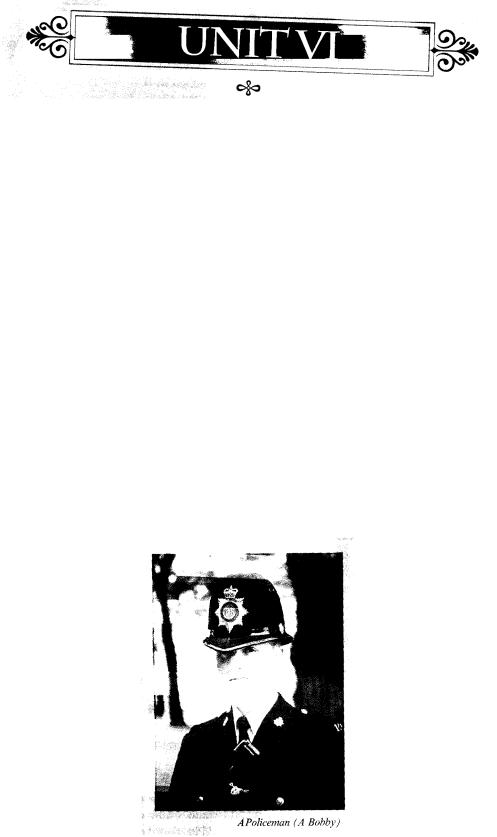
THE 19тн CENTURY – THE VICTORIAN AGE OF THE BRITISH EMPIRE AND... THE NEW
RIVALS
Keywords, terms and concepts:
1.R. Peel, "Peelers or Bobbies"
2.Stephenson's "Rocket"
3.The electoral franchise reform (1832) and other Acts of Parliament
4.The Earl of Shaftesbury, friend of the oppressed
5.Queen Victoria (1837-1901)
6.Great English novelists
7.People's Charters (1838-1839, 1842, 1848). Chartism
8.Potato famine in Ireland, 1846
9.The Crimean War (1854-1856), Victorian politicians and their policies
10.The Education Act, 1870
11.Home Rule for Ireland
12.Britain and Ireland
In the 19th century the post-Napoleonic wars period of reaction was being gradually reformed and more liberal ministers were included in the Government, more progressive policies and laws were adopted. Under ultra-conservatory Wellington, who became Prime minister in 1828, some reforms were introduced: R. Peel, the Home Secretary created an efficient police force, and the policeman were called peelers or bobbies.
The Catholic Emancipation Act was a forced decision that split the Tory party and brought the Whigs to power in 1830. The Whigs were determined to reform the Parliament and the parliamentary franchise, which had not changed since the reign of Elizabeth I. The electoral franchise and distribution of seats in Parliament were in a mess. Different parts of the country were represented in an uneven and unjust way. The county of Cornwall where the population was less than the population of Manchester or Birmingham elected 44 men to the House of Commons, but neither of these big industrial cities elected a single M. P. The voting was not secret, the whole system was corrupt and unrepresentative.

The confusion at Westminster reflected the situation in the country. There were outbreaks of machinebreaking and riots: people exploited at the factories by factory owners and left unemployed by machines replacing them, were outraged; they smashed machines blaming Ned Ludd for it and bearing his name – Luddites, wearing masks and damaging the factories.
The Parliament Reform came together with railways. The Manchester and Liverpool Railway was opened by the Duke of Wellington in 1830. George Stephenson built a locomotive – "the Rocket", which reached a maximum speed of fourty eight kilometres per hour.
The technological revolution was going on strengthened by social reforms that were obviously lagging behind.
The reformed Parliament passed a number of progressive acts, due to Lord Shaftesbury the first effective Factory Act was passed, limitting the hours worked ) by children in cotton factories to nine, prohibiting their employment under nine years of age, and appointing inspectors to see that the decisions were enforced.
The state assumed also some responsibility for the poor. According to the Poor Law all the able bodied poor were to go to the workhouses where the conditions were terrible. It was described by Ch. Dickens in his novel "Oliver Twist". The working classes were infuriated by the injustice and inhumanity of the Poor Law and demanded more radical reforms.
In 1838 the first petition was drawn up by leaders of first association of workers, which was called the People's Charter. It included six main demands for changes: the vote for all males, parliamentary constituencies of equal size, voting by secret ballot, a salary for MPs, no property qualifications for MPs, annual Parliaments. All these reforms seemed revolutionary at that time.
The Chartist movement was supported by the working people, but it had its ups and downs. The first Charter was rejected by Parliament in 1839, which was followed by protests of the working people and repressions by the Government. The Chartist leaders were arrested; the Movement was defeated when the second Petition was also rejected by Parliament in 1842.
The revival of Chartism in 1848 coincided with the Revolution in Europe and with nationalist demands of the Irish, but the third petition having been rejected, Chartism began to decline and grew into the cooperative and trade unionist movements.
The Parliamentary struggles of the Tories and the Whigs, the working classes struggle for social rights and a better life, were all developing against the background of a drastic change in the Monarchy. The only daughter of the Hanoverian Duke of Kent turned out to be the only heiress to the British throne, and after the death other uncle William (William IV 1830-1837) 18 year old Victoria became Queen (1837-1901). Her first Prime Minister, Lord Melbourne, taught the young Queen the duties of the constitutional monarch. The accession of Queen Victoria came at a difficult time: the Whigs lost their popularity and the majority in the House of Commons; the Hungry Thirties passed into the Hungry Forties, and the alternative to the Whigs polices was the new Conservative Party, created by R. Peel. Peel's financial reforms brought revival to the country (1844), and legislation to protect factory and mine workers improved their conditions, but the disaster came with the poor harvests in Britain and Ireland. Famine in Ireland (1845) convinced Peel that the Corn Laws should be repealed
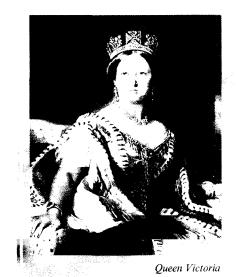
(in 1846). It was the greatest victory of the free traders. But it destroyed the Tory Party and R. Peel was forced to resign.
The reforms brought cheaper food and exports from "the workshop of the world". And the Whigs inherited the benefits of Peel's reforms.
Queen Victoria's Prime Ministers followed one another due to the Political developments in Parliament: Lord Melbourne (1835-1841), Sir R. Peel, Lord John Russel, Earl of Derby, Earl of Aberdeen, Viscount Palmerstone, Benjamin Disraeli, W. E. Gladstone, Earl of Ro-sebery, Marquess of Salisbury.
In 1840 Victoria married her cousin (see Table 6) of Saxe-Coburg of Gotha. The marriage was happy, and the Royal family became a model for moral standards in high society as well as for the middle classes.
Prince Albert became deeply interested in the British affairs, both foreign and home. He was the initiator of a great display of Victorian glory and progress in the country – the Great Exhibition of 1851. This international exhibition was quite a new idea, and Albert had to overcome a lot of opposition. The Exhibition building was an enormous glass-and-iron structure – the Crystal Palace in Hyde Park, it had on display machinery and products from Britain, the Empire and other countries.
"The Crystal Palace" was the symbol of Technological progress. The new poet-laureate Tennyson wrote an ode to it. All the Victorian writers, poets, painters glorified English culture. Tennyson and Browning dominated the poetry. Charles Dickens in his novels David Copperfield, Oliver Twist, Nicholas Nickleby exposed the social evils of the time. Thackeray exposed the middle class hypocracy in his "Vanity Fair". It was a great age for novels. Women writers – the Bronte sisters, Mrs Gaskell–flourished as never before.
Thomas Hardy and Henry James were "Victorian" novelists too. The English drama was brilliantly represented by Irish talents: Oscar Wilde wrote his brilliantly entertaining comedies, Bernard Shaw's plays were more serious but extremely witty.
Painters of the group called the Pre-Raphaelite Brotherhood expressed the great Victorian nostalgia for the Middle Ages.
Victorian science was to become greatly influential on the developments in the Modern Time. These three men: K. Marx (1818-1883) – the founder of Communism, Sigmund Freud (1856-1939) – the founder of psycho-analysis and Ch. Darvin – the founder of the modem theory of biological evolution – shocked the world.
Encouraged by Prince Albert, the Queen came into conflict with Palmerston. In 1854 the Crimean War broke out – when Britain and France declared war on Russia in support of Turkey. Prince Albert had supported the policy of preventing the war while Palmerston was given the Parliamentary support as the only Prime Minister capable of winning the War, and the Queen was compelled to accept him as Prime Minister in 1855. Palmerston became the symbol of British superiority in everything: in fights, in trade, in politics.

The Crimean War revealed the courage of ordinary soldiers and the incompetence of the command. Newspapers reported the shocking conditions in the army hospitals, the terrible organization of supplies: a load of army boots sent out from Britain turned out to be for the left foot. The war solved nothing but it brought a glory to the remarkable work of Florence Nightingale, "the lady with the lamp", who organized hospitals and treatment of the wounded.
In India the British policies aroused a revolt in 1857, it was known as the Indian Mutiny; and it developed into a national movement against foreign rule. There was much violence on both sides. The British brutally punished the defeated rebels, which caused a feeling of animosity that later grew into the Indian Independence movement of the twentieth century.
Queen Victoria suffered a great personal tragedy in 1861 – Prince Consort Albert died of typhoid – and the Queen went into deep mourning, withdrew from public duties and lived in isolation for a decade. Her last thirty-five years of reign were a period of struggle between the new Liberal Party led by W. E. Gladstone and the Conservatives who were headed after Palmerston by Benjamin Disraeli.
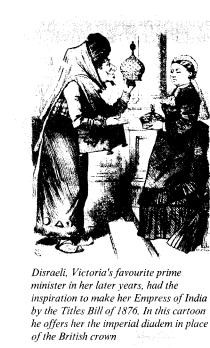
On the great issues which dominated British politics in the last quarter of the 19th century – the extension of the Parliamentary franchise, the limitation of the Power of the House of Lords, social reform, Home Rule for Ireland and the new aggressive imperialist policy abroad – Queen Victoria strongly sympathized with Conservatives and disapproved of Gladstone and Liberals.
B. Disraeli became Prime Minister in 1868 and first held the office for only nine months, but he managed to establish a very close relationship with the Queen and further developed it during his second term of office (1874-1880). В. Disraeli pleased the Queen greatly by persuading Parliament to agree to grant her the title of Emperess of India.
The contest of Disraeli and Gladstone was in full swing, and the two-party system had been already firmly established.
Jingoism (the word for extreme, flag waving patriotism) was encouraged by B. Disraeli, but it was condemned by his rival, the Liberal Leader, William Gladstone.
The Empire, that Great Britain had gained by the middle of the 19th century, was the result of the greatest power that Britain possessed through its command of trade, finance and manufacturing. The colonies were united by English law and by trade, the forms of governing administration varied. The whole population was growing due to the emigration from the British Isles: throughout the 18th, 19th centuries poor and disadvantaged people sought a new and a better life in the colonies. In 1850 New Zealand became the responsibility of the Crown. The population of Australia was expanding rapidly. There were four self-governing colonies: New South Wales, South of Australia, Victoria and Queensland. By the end of the century the Empire was spreading over the continents of Africa, Asia, North America, South America, Australia. The sun did not set on the Empire. The colonial office became a large and important ministry. Imperialism had become popular with the middle classes. The patriots of jingoism sounded more and more aggressive: Cecil Rhodes (the founder of Rhodesia) spoke about the British as a race superior to their colonials. The actions of the imperialists were no less dishonourable: a chain of "small colonial wars" was caused by the aggression of the British imperialism. But the Anglo-Boer War proved to be an unsuccessful surprise to the British people and the proof of a certain weekness of the Empire (1880-1881, 1899-1902).
There was the Irish Problem: the Irish MP's in Parliament demanded Home Rule for Ireland, and Irish extremists committed terrorist actions. Gladstone supported the idea of Home Rule for Ireland – which meant the restoration of the Parliament, that they had lost by the Union with England in 1801 and the control of the Irish local internal affairs. Gladstone's own Liberal Party voted against the Home Rule Bill. The Liberal Party was split and broken. It's role as one of the two major parties in the country was over. The Liberals were to be replaced by the forthcoming Labour Party in the constant struggle against the conservatives.
Due to the Industrial Revolution and the strength of the Empire Great Britain was still the greatest power of the world in the last 30 years of the 19th century. Symbolic of its greatness and the expansion of the Empire were the jubilees of Queen Victoria (1887 and 1897), celebrated with great pageantry and enthusiasm of the
crowds.
The nations of the New World and a strengthened Europe were becoming industrial rivals of Britain. The European countries were partitioning the African continent, and Britain succeeded in adding great African possessions to her Empire: Nigeria, Kenya, Uganda, New Zealand and Rhodesia; the Sudan was jointly administered by Britain and Egypt.
The United States since the end of the Civil War (1862-1865) had progressed greatly and rapidly, supplied the free-trade England with its food products and were developing into a great power.
The role of the United Kingdom at the end of the Victorian Era, at the end of the 19th century was highly important, jingoistic (shovinistic) imperialism and the financial strength spread over the world through the export of capital by the banks of the City, strongly influenced the internal development of the country: AngloSaxon shovinism and superiority complex in the upper spheres and the trade unionism, emigration to the colonies and Dominions, political parties struggle for power were the consequences.
Meanwhile the conflicts and contradictions among the European countries were bringing the world to the brink of the World War, which was destined to bring about great changes in the British role in the world.
Questions:
1.What reforms were introduced by the Whigs and how did they influence the situation in the country in the 30th of the 19th century?
2.What were the repeated attempts of the people to introduce more radical reforms? Describe the programme and the demands of the movement.
3.Who was the Monarch of Britain for the greater part of the 19th century? What were the political affiliations of the numerous Prime Ministers of the century?
4.What can you say about the role of Prince Albert in British Affairs?
5.What were the greatest cultural achievements of the Victorian Age?
6.Why did the British start the Crimean War and who became the heroic figure of the War?
7.What was the policy of Britain in India?
8.What was the difference between the policies of B.Disraeli and Gladstone? How do you understand "jingoism "?
9.How did the overseas possessions of Britain expand? What was the situation in the British Empire?
10.What was the role and the status of Great Britain in the World at the end of the 19th century?
В соответствии со статьей 19 пунктом 2 Закона РФ "Об авторском праве и смежных правах" в данном издании использованы иллюстрации из книг и журналов на:
обложке, стр. 37 -- Магу Queen of Scots.– London: Pitkin Piclorials Ltd. 1972;
стр.2, 14,32. 36,43,48,54, 55, 57. 69 – The lives of the Kings & Queens of England / Ed. A. Fraser– London: Weidenfeld and Nicolson, 1993, стр. 5, 6, 10, 11, 17.20.47.49, 51. 56.57, 58, 59, 61, 64, 66 – Grant N. Hamlyn Children's History of Britain from the Stone Age to the Present Day.– London: Hamlyn, 1989;
стр. 15, 24, 35, 37. 42. 48 – The Oxford Illustrated History of Britain / Ed. K. O. Morgan.– Oxford, New York. 1996; стр. 19, 23. 38, 44 – A Social History of England.– London: Weidenfeld and Nicolson, 1983;
стр. 21 – Westminster Abbey.– London, 1993;
стр. 22, 29. 30, 50. 67 . Britain's Kings & Queens.– London: Pitkin Pictorials Ltd, 1990; стр. 31, 34 – The Six Wives of Henry VIII.– London: Pitkin Pictorials Ltd., 1975;
стр. 38, 62 – Britain. Literary.–Heritage (Буклет), 1983;
стр. 54, 55–Blenheim Palace.– London: The Blenheim Estate Office, 1971;
стр. 68 – Детская энциклопедия. Том 4: Растения и животные.– М.: Из-во АПН РСФСР, 1960.
Учебное пособие
Гурьева Юлия Федоровна
A CONCISE HISTORY OF BRITAIN
"DEEP ARE THE ROOTS..."
(Очерки по краткой истории Британии)
"ГЛУБОКИ КОРНИ..."
Зав. редакцией учебных пособий по английскому языку К. И. Кауфман Корректоры Г. А. Киселева, Г. П. Мартыненко
Дизайн макета и художественный редактор В. С. Жеребцов Сканирование, цветоделение и коррекция изображений Л. Н. Новоселов
Лицензия № 070011 от 17.06.96. Подписано в печать 29.11.99. Формат 70 х 100/16. Печать офсетная. Бумага офсетная № 1. Гарнитура "Тайме". Усл. печ. л. 5,83. Усл. кр.-отт. 24,3. Уч.-изд. л. 5,4. Тир. 5 000. Зак. № 2907 Издательство "Титул". 249020, г. Обнинск Калужской обл., ул. Курчатова, 21, а/я 5055, телефон (08439) 4-82-82. Internet: www.titul.ru, e_mail: sales@titul.ru. Отпечатано с готовых диапозитивов в Калужской типографии стандартов. 248021, ул. Московская, 256.
